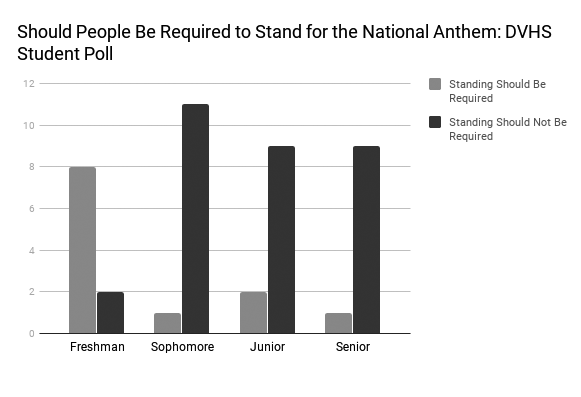Support

November 30, 2017
Refusing to stand for the national anthem is completely justified because it generates meaningful conversation and is a legal form of protest according to the First Amendment.
Former 49ers quarterback Colin Kaepernick first refused to stand during “The Star-Spangled Banner” on Aug. 26, 2016, in order to protest racial injustice and police brutality in the United States. Since then, the controversial topic regarding whether citizens should be required to stand for the national anthem has emerged throughout the nation. Many people believe that the United States is not living up to its ideals of universal freedom, liberty and justice. Currently, many NFL players including Kaepernick and Broncos linebacker Brandon Marshall have been kneeling for the national anthem. Each player kneels for the anthem for issues such as social injustice. Others believe that not standing for the national anthem shows disrespects the flag and members of the armed forces.
Trump tweeted that the NFL should ban kneeling for the anthem. However, the NFL did not impose any such rule. I agree with their decision. I perceive kneeling for the anthem as a form of peaceful protest which should be respected by the public and especially the government.
“You can criticize their speech but don’t ban their speech,” said sophomore Mustafa Hussain.
However, these actions should not be overused to the extent that every other day, a student at school is kneeling during the anthem. They should only be done when the national problem has reached a new height.
When a popular figure such as an NFL athlete refuses to stand for the national anthem, it leads to greater education of the audience when more people become aware about the national issues.
“Other nations are surprised we are very mechanical and robotic about it. I believe we all have the freedom to protest,” said AP World Teacher Evan Liddle.
In the First Amendment, the freedom of speech is stated in the list of natural rights for a citizen. Even former President Barack Obama acknowledged that Kaepernick was “exercising his constitutional right to make a statement.” In addition, a letter signed by 35 veterans stated that “there is no finer form of appreciation for our sacrifice than for Americans to enthusiastically exercise their freedom of speech.” All these examples show that kneeling during the national anthem is supported by the First Amendment.
Kneeling during the national anthem educates the public about events occurring around them and is clearly protected as an indirect form of the freedom of speech. An individual choosing to use their rights is critical for encouraging change in the subject of interest.

